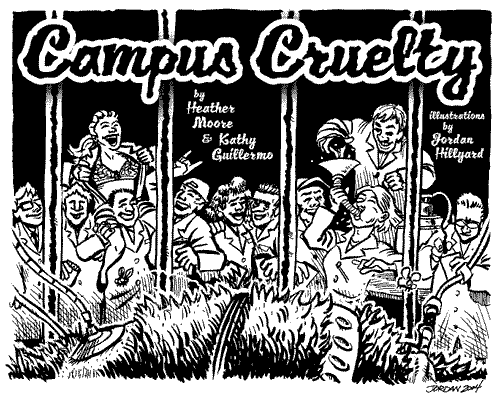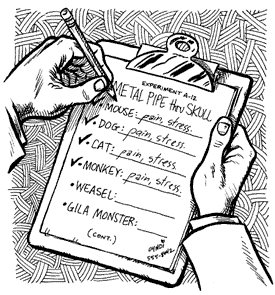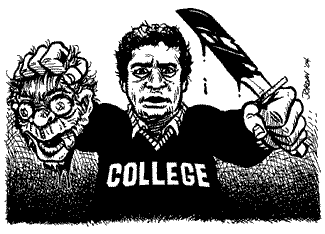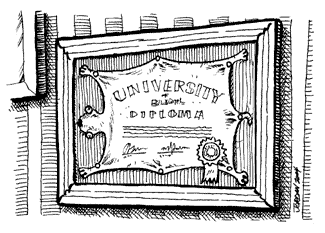Donate to IMPACT
Click below for info


• Campus Cruelty
• Quickies
(music reviews)
 • E-Mail Comments
• Archives
• Subscribe to IMPACT
• Where to Find
IMPACT
• Buy IMPACT T-Shirts
• Ordering Back Issues
• Home
|

art/Jordan Hillyard
"Animal abuse" may not be listed on the curriculum at any of the colleges or universities around the country,but behind closed doors at many academic institutions, graduate students and faculty supervisors cause pain and suffering to primates, rodents, cats, dogs, and other animals through laboratory experiments.
The experiments are often funded by the National Institutes of Health (NIH) or by private industries, such as pharmaceutical companies. The amount of funding a professor brings to a university and the number of papers he or she publishes, no matter how frivolous or irrelevant, influences whether he or she becomes a full professor and receives tenure. But often the professors' success and the students' so-called education come at the expense of countless animals.
Extreme Cruelty and Callousness at UNC
Animals used in alcohol experiments at the University of North Carolina-Chapel Hill (UNC), for example, have repeatedly been denied proper veterinary care, euthanasia, space, and sustenance. In 2002, an investigator from People for the Ethical Treatment of Animals (PETA) went undercover at UNC and exposed grotesque cruelty to rats and mice.
The research staff at UNC allegedly exhibited incompetence, indifference, and unethical behavior. One researcher reportedly killed 23 mice by breaking their necks with a metal cage-card holder. Another doused eight-day-old rat pups with ethyl alcohol and cut their heads off with scissors. He acknowledged that he is supposed to put the pups on ice for four minutes before cutting their heads off because "animal rights people" and the "committee" believe this method to be more humane; however, he admitted that when the reports are written up, he claims to have put the pups on ice.
PETA's investigator also witnessed a researcher repeatedly attempt to insert catheters down the throats of rats to inject an amount of alcohol that would simulate a drinking binge. He told the investigator that he sometimes holds the rats so tightly they turn blue. Many other mice lost their eyes because of the researchers' grossly inadequate skills in performing orbital bleeding–a procedure in which a glass pipette is stuck into the back of the animal's eye.
Researchers and their assistants routinely shook rats in the air or swung them by the tail prior to injections in order to disorient the animals so they wouldn't bite the researchers, even though the researchers wore thick protective gloves.
 Animals were often left to suffer and die slowly instead of being painlessly euthanized. In one instance, PETA's investigator told the head veterinarian, who was fully authorized to euthanize animals, that a rat was suffering from paralysis from the neck down. The investigator was told that the rat would probably have to "hang in there" until the veterinarian received "permission" from the researcher to euthanize the rat. In another case, a mouse with a distended belly was left to suffer for days while a vet tech and veterinarian–who recommended that the mouse be euthanized on the spot–waited for "permission" from the researcher. Animals were often left to suffer and die slowly instead of being painlessly euthanized. In one instance, PETA's investigator told the head veterinarian, who was fully authorized to euthanize animals, that a rat was suffering from paralysis from the neck down. The investigator was told that the rat would probably have to "hang in there" until the veterinarian received "permission" from the researcher to euthanize the rat. In another case, a mouse with a distended belly was left to suffer for days while a vet tech and veterinarian–who recommended that the mouse be euthanized on the spot–waited for "permission" from the researcher.
Rats and mice who were pregnant or suffering from severe weight loss, chronic diarrhea, bloody tumors and lesions, and other negative effects of the study were often denied euthanasia simply because the babies had yet to be "harvested" and/or the study completed. Mice with implants breaking through their skin and rats with "huge sores" and "oozing scabs" around devices implanted in their skulls were considered "normal."
One research assistant even told PETA's investigator: "I don't want you to take this the wrong way, but it is very disruptive when you call us every day." She insisted that she not be contacted, even when animals were dying.
The animals at UNC were severely overcrowded in their cages. Newborn animals were often trampled and suffocated under the bodies of their cagemates or starved to death when unable to find or reach their mothers.
When presented with water, thirsty and dehydrated rats and mice would become frenzied, often fighting to be the first to drink. On one occasion, our investigator witnessed rats who stood on their hind legs to reach the water, and drank for so long they had to reach out their arms to each other for balance.
PETA filed a formal complaint with NIH, which provided UNC with $397 million in federal research money last year. At the end of its investigation, NIH agreed with PETA and found that UNC had committed serious violations, including failure to provide veterinary care to sick and injured animals.
UNC Didn't Learn Its Lesson
But one year later, in January 2003, another undercover investigator from PETA went back inside UNC and after 11 months in the laboratory found that, in contrast to UNC's assurance to NIH that it had completely redesigned its animal care program, had provided training to researchers and had improved oversight, animals were still severely overcrowded, left without veterinary care, and killed inhumanely.
The second investigator, hired to work in the same building and on some of the same experiments, found that UNC had lied outright to NIH about cleaning up its act. The investigator saw researchers animals' toes amputated by researchers merely for identification purposes; mice with oversized tumors that had ulcerated and burst; live animals who would have been thrown away along with the rest of the cage contents when the cages were cleaned had the investigator not intervened; seriously sick and injured animals left to die without veterinary care; a guillotine blade so dull that two fully conscious rats' necks were hacked twice in order to sever their heads from their bodies; and more.
Since UNC has shown that it won't comply with the minimal standards for basic care set by the government for using mice and rats in experiments, and since it won't police itself or properly discipline experimenters who disobey orders from NIH, PETA is now urging the government agency to revoke its funding of UNC and close down university's animal laboratories.

Cruelty at Columbia University
UNC is by no means the only university guilty of cruelty to animals. According to Dr. Catherine Dell'Orto, a postdoctoral veterinary fellow at Columbia University in New York, baboons are used in invasive surgeries and left to suffer and die without pain relief. When PETA, the U.S. Department of Agriculture (USDA) and the university's own internal investigators checked into Dell'Orto's claims, they concluded that Columbia did not provide basic post-surgical care, adequate veterinary care, or euthanasia to animals used in experiments. Yet, shockingly, the experiments have not been stopped.
Researchers at Columbia artificially induced strokes in baboons by removing their left eyeballs to access and clamp critical blood vessels to their brains and administer experimental drugs. Records show that baboons have been observed hunched over in their cages, unable to drink, chew, or lift their heads, and left without veterinary care.
The experimenters also surgically implant metal pipes into monkeys' skulls for the sole purpose of inducing stress so that they can study the connection between stress and women's menstrual cycles. One monkey, left to recover from the hideous implant surgery, was photographed with blood running down her face long after she had come out of anesthesia. The animals were apparently given only an aspirin after the anesthetics wore off.
In another experiment, nicotine and morphine were pumped into pregnant baboons who were strapped into backpacks and tethered inside their metal cages even though the effects of these substances on fetuses is already well known. The primates' babies underwent surgery while still in utero. One baboon lost 40 percent of her body weight, and her severe bone infection was left untreated. Another baboon endured five surgeries. All of these were approved by Columbia's ineffectual Animal Care and Use Committee. These committees are charged with reviewing and stopping experiments that are scientifically invalid or unnecessarily cruel, but most appear to rubber stamp research protocols and offer little protection for the animals.
Despite the obvious abuse, Harvey Colten of Columbia wrote in a June 30, 2003, letter to Dell'Orto, "The University has reported the results of its investigation of your allegations to the Office of Laboratory Animal Welfare of the Public Health Service ('OLAW') and to the U.S. Department of Agriculture ('USDA'). Both agencies have acknowledged receipt of the report and expressed satisfaction with the investigative process and with the corrective actions imposed as a result."
PETA filed complaints against Columbia with the federal government, the New York state attorney general's office, and the New York County district attorney's office after investigating the veterinarian whistleblower's reports of cruelty to primates used in the university's labs. The school has suspended the stroke experiment, but the others continue.
Palmer Chiropractic University Lacks Backbone and Heart
The Palmer College of Chiropractic, which is based in Davenport, Iowa, and has branch campuses in San Jose, Calif., and Port Orange, Fla., has, for years, performed crippling spinal experiments on animals, including rabbits, mice, rats, and most recently, cats. Palmer has used more than a million dollars in tax money grants to disfigure animals, and in one proposed study, now scrapped, experimenters planned to use scissors to cut off the tails and legs of more than 100 rats. Palmer's federal grant applications show that, by the end of 2003, Palmer had killed 240 cats in a two year period. During 2001 through 2003, Palmer cut into and killed approximately 120 rats in other spinal experiments. These two sets of experiments cost more than $589,000, and Palmer has applied to the National Center for Complementary and Alternative Medicine (NCCAM) for another $500,000 grant to fund the killing of approximately 360 more cats over the next four years.
When questioned about the validity of animal studies in this uniquely human profession, representatives from Palmer claimed that they must engage in "basic science" because the chiropractic profession has been "under attack" by the health and science professions. This indicates that the purpose of these studies is primarily to satisfy critics and establish chiropractors as part of the more mainstream scientific establishment.
Palmer's intent to continue this practice of abuse is evident in its recent construction of a $4 million laboratory in which it will conduct spinal experiments on animals. Approximately $1.3 million of the facility's cost comes from taxpayer money.

Activists Accuse U.C. Davis Primate Center of Abuse
One of the issues facing watchdog organizations is the difficulty of obtaining accurate information about what goes on in university laboratories. While PETA has placed investigators inside facilities, other organizations rely on government mandated reports for clues about possible abuse. A Cincinnati, Ohio, group called Stop Animal Exploitation Now (SAEN) has used evidence in a USDA report to file a complaint against the federally funded primate laboratory at the University of California at Davis.
According to SAEN, the reports show that primates died of a variety of diseases, including pneumonia, encephalitis, and meningitis, yet the lab claims no animals experienced pain or distress. SAEN also claims that experimenters routinely conduct redundant and scientifically meaningless research.
In August, not long after SAEN filed the complaint, the U.C. Davis primate laboratory made headlines when seven monkeys died after a heating system in their quarters malfunctioned. Temperatures soared to 115 degrees Fahrenheit and the monkeys, who were unsupervised, died of dehydration. The heating/air conditioning unit was not equipped with a protection device to switch off the system when temperatures rose above an acceptable level.
Cruelty Charges Filed
On September 15, 2004, the USDA filed a complaint against the University of California, San Francisco, for a whopping 60 violations of the Animal Welfare Act. The university is this country's fourth largest recipient of grants from NIH, and is now using monkeys, squirrels, pigs, mice, rats, rabbits, cats, dogs, ferrets, and sheep in more than 500 different studies.
USDA investigators focused on the animals, alleging that UCSF experimenters failed to provide adequate pain relief, veterinary care, post-surgical care, and even water. In one of the most serious charges, the USDA said that researchers performed surgery on a ewe and her fetus without any anesthesia or pain killer, and cut into the brain of a monkey without anesthesia or pain killers.
The California-based animal protection organization In Defense of Animals (IDA), which has monitored UCSF's animal laboratories for the last six years, points out that the USDA uncovered these violations during its routine twice-a-year inspections of the laboratories.
"A lot of the suffering occurred in front of the eyes of the inspector," says IDA's Suzanne Roy. "You can only imagine what goes on when the inspector is not present."
This isn't the first time the university has come under fire. In 2000, a UCSF experimenter used water deprivation to train monkeys. The university agreed to pay a $2,000 penalty for this violation.
Higher Education Shouldn't Come With Lower Ethics
 Even as NIH and other government institutions dole out millions in research grants, many in the scientific community are turning away from animals as research tools. Realizing that, in fundamental ways, animals are not physiologically the same as humans, scientists are embracing sophisticated technologies that are proving more and more often to be superior. Among these are human cell-line tests, tissue cultures, virtual organs, mathematical models, and clinical and epidemiological studies. Even as NIH and other government institutions dole out millions in research grants, many in the scientific community are turning away from animals as research tools. Realizing that, in fundamental ways, animals are not physiologically the same as humans, scientists are embracing sophisticated technologies that are proving more and more often to be superior. Among these are human cell-line tests, tissue cultures, virtual organs, mathematical models, and clinical and epidemiological studies.
Scientists may also object to animal studies for ethical reasons, and now, as never before, they are turning away from the traditional, animal-based methods of research. Much of this new attitude comes from the students. Medical students at Harvard, Yale, Stanford, and other leading universities advocated the replacement of the use of live animals in physiology, pharmacology, and/or surgical-training exercises with humane and effective non-animal teaching methods. For example, students now observe actual human cardiac bypass surgery, rather than inducing heart failure in dogs.
Despite this apparent shift in academic attitude, the majority of non-animal testing methods are being developed by private firms who aren't affiliated with universities. These scientists, for both ethical and financial reasons, have decided to invest in what they believe will be the new wave of research. Whereas universities have traditionally been at the cutting edge of research, in this area, many appear to be lagging behind private industry.
Throwing the Book at Campus Animal Abusers
Much of what has been uncovered behind the closed doors of university laboratories came from employees and students inside those facilities. Workers who may not oppose the use of animals for experimentation have time and again come forward with stories of filthy conditions, outright mistreatment of animals, and redundant, pointless experiments.
While activists, employees, and PETA investigators document what has occurred, the power to change it lies with students, alumni, and concerned taxpayers–these are the people who have the ears of congress and university administrators.
Speak Your Mind
We are not powerless to stop the inhuman animal experiments at UNC, Columbia, Palmer, and other universities nationwide. Concerned individuals should implore the inspector general of the Department of Health & Human Services to intervene on behalf of animals at UNC. There must be a thorough housecleaning at UNC that extends from the highest-paid positions to the lowest.
Dara Corrigan
Acting Principal Deputy Inspector General
Dept. of Health & Human Services, Cohen Bldg.
330 Independence Ave. S.W., Rm. 5250
Washington, DC 20201
In March 2003, the Subcommittee on Oversight & Investigations wrote to NIH Director Elias A. Zerhouni about a probe into NIH spending that it intended to undertake. Citizens should ask the Subcommittee to look into the millions of tax dollars given to Columbia University for cruel, ineffective baboon experiments that do not even comply with federal law. For all the money it receives, Columbia does not provide the primates with any socialization or enrichment, as legally required.
The Honorable Joe L. Barton
Acting Chair of the Energy & Commerce Subcommittee on Oversight & Investigations
2125 Rayburn House Office Bldg.
Washington, DC 20515-3808
commerce@mail.house.gov
People can also pressure the Secretary of Health and Human Services to order Elias A. Zerhouni to close Columbia's animal laboratories until a thorough investigation and housecleaning can be completed:
The Honorable Tommy G. Thompson
Secretary of Health and Human Services
Hubert H. Humphrey Building
200 Independence Ave. S.W.
Washington, DC 20201
matthew.bluhm@hhs.gov
Of course, the person who is most concerned with raising funds for Columbia also needs to hear from outraged individuals:
David Stern
Commissioner of the NBA
Chair of the Board of Trustees
Columbia University
Olympic Tower
New York, NY 10022
Anyone wanting to help the animals at Palmer University should ask officials to promote healing without harming animals.
William Meeker, D.C., M.P.H., Vice President of Research
Palmer Chiropractic University System
1000 Brady St.
Davenport, IA 52803-5287
meeker_b@palmer.edu
Gloria Y. Niles, D.C., Dean
Palmer College of Chiropractic Florida
4705 Clyde Morris Blvd.
Port Orange, FL 32129-4103
niles_g@palmer.edu
•
Heather Moore and Kathy Guillermo are staff writers for People for the Ethical Treatment of Animals (PETA).
Email your feedback on this article to editor@impactpress.com.
Make an IMPACT
Other articles by Heather Moore:
|




 Animals were often left to suffer and die slowly instead of being painlessly euthanized. In one instance, PETA's investigator told the head veterinarian, who was fully authorized to euthanize animals, that a rat was suffering from paralysis from the neck down. The investigator was told that the rat would probably have to "hang in there" until the veterinarian received "permission" from the researcher to euthanize the rat. In another case, a mouse with a distended belly was left to suffer for days while a vet tech and veterinarian–who recommended that the mouse be euthanized on the spot–waited for "permission" from the researcher.
Animals were often left to suffer and die slowly instead of being painlessly euthanized. In one instance, PETA's investigator told the head veterinarian, who was fully authorized to euthanize animals, that a rat was suffering from paralysis from the neck down. The investigator was told that the rat would probably have to "hang in there" until the veterinarian received "permission" from the researcher to euthanize the rat. In another case, a mouse with a distended belly was left to suffer for days while a vet tech and veterinarian–who recommended that the mouse be euthanized on the spot–waited for "permission" from the researcher.


 Even as NIH and other government institutions dole out millions in research grants, many in the scientific community are turning away from animals as research tools. Realizing that, in fundamental ways, animals are not physiologically the same as humans, scientists are embracing sophisticated technologies that are proving more and more often to be superior. Among these are human cell-line tests, tissue cultures, virtual organs, mathematical models, and clinical and epidemiological studies.
Even as NIH and other government institutions dole out millions in research grants, many in the scientific community are turning away from animals as research tools. Realizing that, in fundamental ways, animals are not physiologically the same as humans, scientists are embracing sophisticated technologies that are proving more and more often to be superior. Among these are human cell-line tests, tissue cultures, virtual organs, mathematical models, and clinical and epidemiological studies.